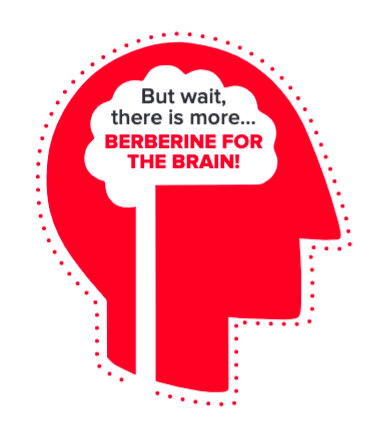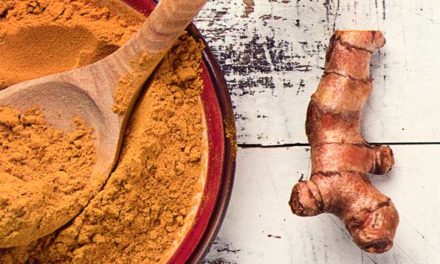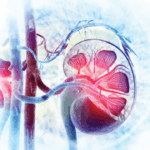
Due to the overwhelmingly positive response from Women’s Voice readers to Dr. Jensen’s first article: Berberine – Nature’s Metabolic Master Switch, in volume 4 of the Women’s Voice magazine, we asked her to add additional information on the many incredible benefits of berberine.
Berberine in review:
In my first article, I outlined the many positive effects that berberine has on metabolic disorders such as cardiovascular disease, metabolic syndrome, obesity, and diabetes via activation of adenosine monophosphate-activated protein kinase (AMPK). AMPK, through various biochemical pathways, reduces inflammatory mediators, and regulates various biological activities that normalize lipids, glucose, and energy imbalances.

Berberine for neurological disorders and mood disorders
Due to its ability to affect multiple systems in the brain, researchers have suggested that berberine could be beneficial in Alzheimer’s disease, and mood disorders such as depression and anxiety. Investigations into berberine and depression have been especially positive, with preliminary results suggesting that berberine supplements may serve as an impressively effective antidepressant.
Many consumers are not familiar with berberine as a dietary supplement, but this little-known all-natural plant-based alkaloid is making headlines and has solid research showing vast health benefits.
Researchers are just getting started on berberine for mood disorders and if human studies prove to have the same efficacy as in animal studies, berberine may become a first-line depression treatment.

Berberine for neurological disorders and mood disorders
Due to its ability to affect multiple systems in the brain, researchers have suggested that berberine could be beneficial in Alzheimer’s disease, and mood disorders such as depression and anxiety. Investigations into berberine and depression have been especially positive, with preliminary results suggesting that berberine supplements may serve as an impressively effective antidepressant.
Many consumers are not familiar with berberine as a dietary supplement, but this little-known all-natural plant-based alkaloid is making headlines and has solid research showing vast health benefits.
Researchers are just getting started on berberine for mood disorders and if human studies prove to have the same efficacy as in animal studies, berberine may become a first-line depression treatment.
The dosage for berberine is 1000–1500 mg per day.
Some of the mechanisms involved in neurological disorders include the following:
- Preliminary animal studies which show that berberine increases neurotransmitters in the brain – including norepinephrine (31%), serotonin (47%), and dopamine (31%). Please note that low concentrations of these neurotransmitters in the brain have not been established to be the sole causative factor of depression. However, there is a significant correlation between neurotransmitter concentrations and depression.
- Berberine reduces inflammation in the brain which is an underlying factor in the development of depression
- Berberine increases production of certain chemicals in the brain, including brain-derived neurotrophic factor (BDNF), a protein involved in the formation of new neuronal connection, Depression and stress reduce the production of BDNF and berberine appears to help heal damage of the neuronal tracts which in turn contributes to remission and recovery.
- Gut-brain axis – researchers know that the gut microbiota can produce or stimulate the production of neurotransmitters and other neuroactive compounds, such as serotonin, GABA, and dopamine. When the gut is inflamed due to many different factors including stress and lifestyle choices, the production of neurotransmitters is compromised. The gut-brain is a two-way communication system which means that inflammation in the gut or brain causes inflammation in the other. The anti-inflammatory and antimicrobial properties of berberine reduce inflammation in the gut and brain. This is important because recent research shows that brain inflammation is an important underlying factor in depression.
- Depression is more than just a mental disorder – people with depression can also commonly suffer from other conditions at the same time, including immune system dysregulation, and disturbances in stress hormones. The gut microbiota play a vital role in immunity, hormonal balance, and nervous system functioning.
Berberine’s antimicrobial properties:
1. Antibacterial
Preliminary animal studies have found that berberine helped inhibit the growth of Staphylococcus aureus and is able to damage the DNA and protein of certain other bacteria. S. aureus can cause many health problems, including sepsis, pneumonia, meningitis, and a range of skin conditions.
2. Antiviral
Herpes simplex virus (HSV) infection causes facial herpes (cold sores), genital herpes. Berberine alkaloids were shown to reduce viral ribonucleic acid (RNA) transcription, protein synthesis, and viral load. They were also found to be effective when used at the early stage of HSV replication cycle.
3. Antiviral – influenza
Berberine exhibited antiviral effects on the influenza virus both in vitro and in vivo. The possible therapeutic mechanism of berberine on influenza-induced viral pneumonia is thought to be due to inhibition of the virus infection, as well as improving the pathogenic changes by reducing inflammatory mediators.
References
- Chu M, Zhang MB, Liu YC, et al. Role of berberine in the treatment of methicillin-resistant Staphylococcus aureus infections. Sci Rep. 2016; 6:24748.
- Song S, Qiu M, Chu Y, et al. Downregulation of cellular c-Jun N-Terminal Protein Kinase and NF-kB activation by berberine may result in inhibition of herpes simplex virus replication. Antimicrob Agents Chemother. 2014; 58(9):5068-5078.
- Wu Y, Li JQ, Kim YJ, et al. In vivo and in vitro antiviral effects of berberine on influenza virus. Chin J Integr Med. 2011; 17(6):444-52.
- Yan YQ, Fu YJ, Wu S, et al. Anti-influenza activity of berberine improves prognosis by reducing viral replication in mice. Phytother Res. 2018; 32(12):2560-2567.
- Fan J, Li B, Ge T, et al. Berberine produces antidepressant-like effects in ovariectomized mice. Sci Rep. 2017; 7:1310.
- Xiang HC, Lin LX, Hu XF, et al. AMPK activation attenuates inflammatory pain through inhibiting NF-kB activation and IL-1B expression. J Neuroinflammation. 2019; 16(1):34.
- Kulkarni SK, Dhir A. Berberine: a plant alkaloid with therapeutic potential for central nervous system disorders. Phytother Res. 2010; 24(3):317-24.
- Liu YM, Niu L, Wang LL, et al. Berberine attenuates depressive-like behaviours by suppressing neuro-inflammation in stressed mice. Brain Res Bull. 2017; 134:220-227.
- Shen JD, Ma LG, Pei YY, et al. Berberine up-regulates the BDNF expression in hippocampus and attenuates corticosterone-induced depressive-like behavior in mice. Neurosci Lett. 2016; 614:77-82.
- Zhu X, Sun Y, Zhang C. Effects of berberine on a rat model of chronic stress and depression via gastrointestinal tract pathology and gastrointestinal flora profile assays. Mol Med Rep. 2017; 15(5):3161-3171.












